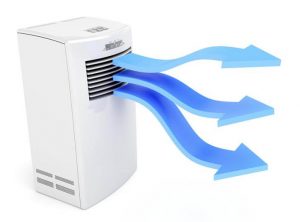As the summer season draws near, most people wonder whether they need an air conditioner or a dehumidifier. The UK gets very humid once the summer sets in and makes it difficult to live comfortably without either of these appliances. But which one should you buy? Let’s find out.
We have also compiled a a list of the top portable air conditioners and dehumidifiers to compare the best available.
Contents
Key Takeaways
- An air conditioner reduces room temperature and humidity, making it suitable for hot and humid climates, while a dehumidifier primarily removes excess humidity without significantly cooling the room.
- Benefits of a dehumidifier include preventing mould growth, improving air quality, eliminating dust mites, and keeping your home dry, especially in humid conditions.
- Air conditioners are effective at cooling rooms, improving air quality, preventing overheating electronic devices, and reducing the risk of dehydration in hot weather.
What’s the Difference Between an Air Conditioner and a Dehumidifier?
A dehumidifier removes excess humidity without necessarily reducing the room’s temperature significantly. An air conditioner, on the other hand, reduces both the room’s temperature and humidity.
If you are living in an area where there is too much humidity, but you don’t need to bring the room’s temperature down, you should choose a dehumidifier. But if you also want to keep your room cool and comfortable, it’s best to buy an air conditioner since it also keeps the humidity under control.
Apart from their overall functions, there’s a slight difference in their construction also. A dehumidifier passes air through a line of cooling coils. The air immediately travels over a range of heating coils and then emits from the outlets into the room as dry air. This air is usually warm, and it sucks the humidity from the room within minutes.
In an air conditioner, air passes through cooling coils and then emits from the outlets. The heated air that the AC sucks from the room goes through a tube, enters a series of heating coils, and then outside the room.
What Are the Benefits of a Dehumidifier?
Prevents Mould
 Moulds can become the cause of your nightmare soon if you don’t get rid of them quickly. Their growth leads to various allergies, such as itchy throat, sneezing, skin rashes, throat and eye irritation, and frequent coughing. They can also contribute to asthma attacks. Moulds grow in areas where there is at least 50% humidity in the air. Installing a dehumidifier can prevent their growth and keep your home free from allergies.
Moulds can become the cause of your nightmare soon if you don’t get rid of them quickly. Their growth leads to various allergies, such as itchy throat, sneezing, skin rashes, throat and eye irritation, and frequent coughing. They can also contribute to asthma attacks. Moulds grow in areas where there is at least 50% humidity in the air. Installing a dehumidifier can prevent their growth and keep your home free from allergies.
Improves Air Quality
A dehumidifier also improves the quality of air in your house. Humid air consists of high amounts of toxins that disappear once you start using a dehumidifier. Many people use houseplants in the hope of keeping the air in their homes clean. But with humid air, it’s challenging for plants to do their job. In such cases, you must install a dehumidifier as soon as possible.
Eliminates Dust Mites
Like moulds, dust mites create havoc in homes by spreading allergies. From sneezing to sore throat, dust mites produce an unfavourable environment in your house. This happens only because of the humid air. And using a dehumidifier can prevent such allergies by eliminating these dust mites.
Makes Your Home Dry
Too much humidity can make your floors wet. Even if you mop it frequently, the surfaces seem wet again. This isn’t good for wooden floors. It can affect your expensive rugs and carpets also. But with a dehumidifier around, these things won’t take place. It absorbs the humid air and prevents the floor from getting wet.
What Are the Benefits of an Air Conditioner?
Keeps Rooms Cool
The primary reason why most people use air conditioners is to cool their rooms. Air conditioners are lifesavers during summers. The scorching heat of the UK almost gives you skin burns when you go out. You shouldn’t feel the same way when you come home. It would be like living in a pressure cooker. Instead, install an air conditioner and keep your house cool.
Improves Air Quality
 Like dehumidifiers, air conditioners also improve the air quality in your home. They not only circulate cold air but also filter it so that there are no cases of allergies in your house due to moulds and dust mites. This feature is crucial for those who are prone to allergies and those who have breathing issues like asthma. Air conditioners reduce the irritants in the air that cause such health problems.
Like dehumidifiers, air conditioners also improve the air quality in your home. They not only circulate cold air but also filter it so that there are no cases of allergies in your house due to moulds and dust mites. This feature is crucial for those who are prone to allergies and those who have breathing issues like asthma. Air conditioners reduce the irritants in the air that cause such health problems.
Prevents Overheating of Electronic Devices
You may notice that office rooms with multiple computers contain air conditioners. This not only keeps the temperature of the rooms down but also to prevent the computers from overheating. Similarly, rooms with bulky electronic devices like DTP printers and other appliances also contain ACs as these machines work best when their temperature remains under control.
Reduces Chances of Dehydration
Sweating in the scorching heat means your body is losing large quantities of water. If you don’t drink water, your body will get dehydrated. Apart from drinking water, your body temperature should also come down to prevent dehydration. And air conditioners can provide that function. Even if you rest in a room with an air conditioner without drinking water a lot of water, your body will retain its average quantity of water in some time.
Do I Need an Air Conditioner or a Dehumidifier?
It depends on your purpose. If you want to reduce the humidity of the room without bringing down the room temperature, you should buy a dehumidifier. But if you want to keep your room cool and get rid of excess humidity, then there’s nothing better than an air conditioner.
If you compare both appliances based on the energy they consume, it will keep dehumidifiers slightly ahead. Dehumidifiers come with optimal fan speed sensors that can control power consumption. But air conditioners don’t have such features. You may need to spend a few more pounds and purchase an inverter AC to save on electric bills.
Power consumption also depends on how much time you are using the air conditioner or dehumidifier. You may not need to keep the AC on 24 x 7. But it is better to use the dehumidifier for most parts of the day to keep the room’s humidity under control.
Heat Pump Source: Reliable Heating and Cooling Solutions
At Heat Pump Source, we take pride in our unwavering commitment to serving the UK with top-tier HVAC solutions. From the efficiency of heat pumps and the cool relief of air conditioning to the warmth of boilers, radiators, and underfloor heating, our dedicated team is always at the forefront of innovation. We understand the unique needs of every household and business, and we strive to provide dependable health and cooling products and services that are tailored just for you. Ensuring your comfort and satisfaction is our utmost priority. Whether you have questions, need guidance, or require support, we’re always here to assist. Please don’t hesitate to contact us; we’re eager to be of service.
Conclusion
Now that you know the differences between an air conditioner and a dehumidifier in detail, you should be able to buy one according to your needs.
About the Author
At Heat Pump Source, our articles are the product of a collaborative effort among a team of highly skilled HVAC experts. Our dedicated professionals, hailing from diverse backgrounds in heating, ventilation, air conditioning, and refrigeration, contribute their extensive knowledge and experience to every piece of content. This multidisciplinary approach ensures comprehensive coverage. Our commitment is to deliver authoritative, reliable, and tailored advice to meet the unique needs of every household and business across the UK.

